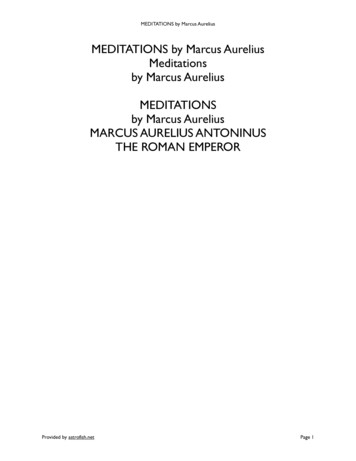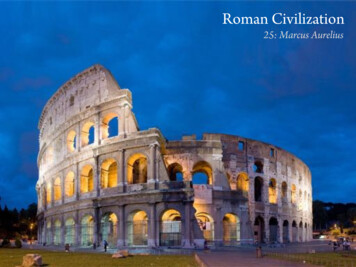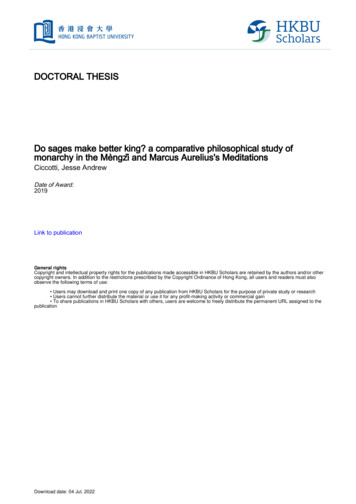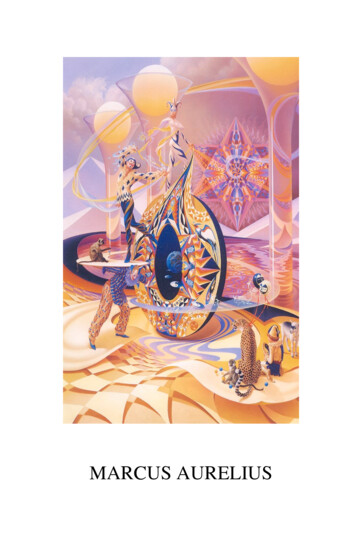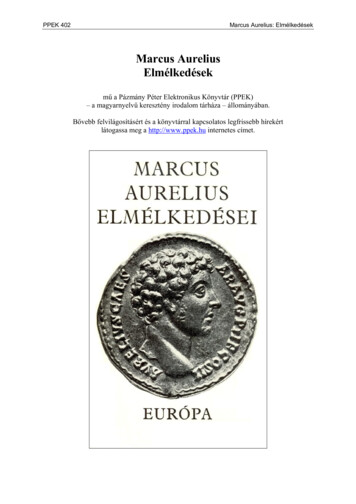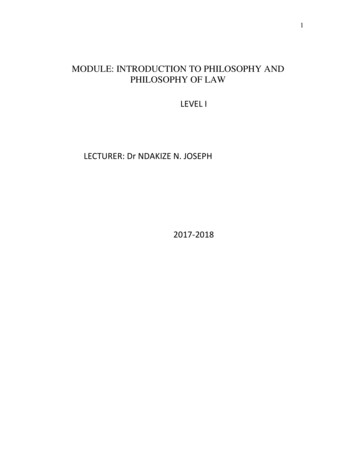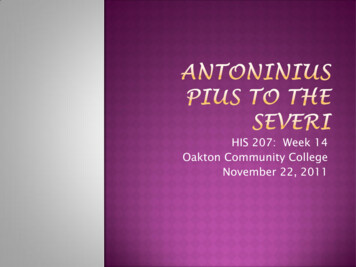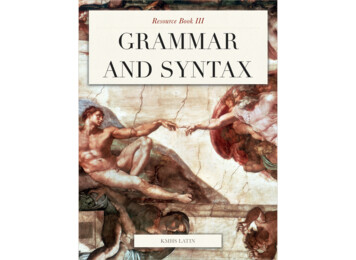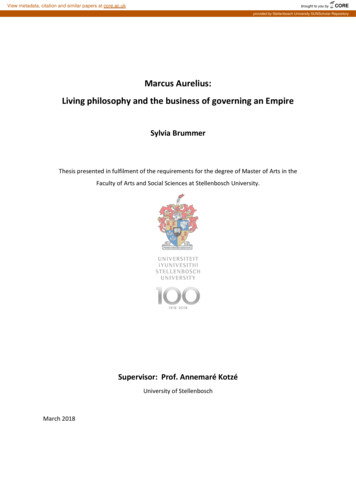
Transcription
View metadata, citation and similar papers at core.ac.ukbrought to you byCOREprovided by Stellenbosch University SUNScholar RepositoryMarcus Aurelius:Living philosophy and the business of governing an EmpireSylvia BrummerThesis presented in fulfilment of the requirements for the degree of Master of Arts in theFaculty of Arts and Social Sciences at Stellenbosch University.Supervisor: Prof. Annemaré KotzéUniversity of StellenboschMarch 2018
Stellenbosch University https://scholar.sun.ac.zaDECLARATIONBy submitting this thesis electronically, I declare that the entirety of the work contained therein ismy own, original work, that I am the sole author thereof (save to the extent explicitly otherwisestated), that reproduction and publication thereof by Stellenbosch University will not infringe anythird party rights and that I have not previously in its entirety or in part submitted it for obtainingqualification.March 2018Copyright 2018 Stellenbosch University.All rights reserved.
Stellenbosch University https://scholar.sun.ac.zaENGLISH ABSTRACTThis study attempts to understand the actions of one specific leader, the philosopher-emperorMarcus Aurelius, who ruled the Roman Empire during the second century CE. Consideration is givento how his decisions and actions were influenced, either consciously or subconsciously by bothinternal and external influences throughout his reign. In this, the study explores examples from hislife and illustrates how both Stoic and Roman ethics may have influenced his leadership decisions,focussed on three specific spheres, namely actions around his familial and friendship relationshipswith focus on his relationship with his adoptive father, Antoninus Pius, his wife, Faustina, hisbrother, Lucius Verus and his son Commodus; slavery; and the persecution of Christians.Central to the study are two principles which are explored throughout the study in terms of howthey relate to the actions of Marcus Aurelius, namely: the principle of philosophy of action and theprinciple of practical ethics.Chapter one considers introductory issues and the rationale for the study. In chapter two the studyexamines the formation of the man, Marcus Aurelius, his character, his education and possibleinfluencers that could have contributed to his actions. The chapter provides an historical overviewof Marcus Aurelius’ education from childhood through to emperorship and considers his presumedmove away from rhetoric to philosophy. Roman and Stoic thought is considered in order to providea more rounded exploration of the factors that shaped Marcus Aurelius’ decisions and an attempt isalso made to understand wider thought in the second century CE in order to provide context withinwhich to view Marcus Aurelius’ thought and actions.In chapter three the purpose of his Meditations is explored in order to provide a view on MarcusAurelius’ character and philosophical development as it emerges from the themes utilised in theMeditations and highlighting his philosophy of actions.The final chapter considers Marcus Aurelius’ career in respect of the three focus areas. The extentto which his education and philosophical convictions influenced his decisions in these spheres isexplored. The chapter also explores certain contradictions found in the image of Marcus Aurelius inorder to arrive at a re-evaluation of his political career.ii
Stellenbosch University https://scholar.sun.ac.zaAFRIKAANSE OPSOMMINGHierdie studie poog om die optrede van 'n spesifieke leier, die filosoof-keiser Marcus Aurelius, watgedurende die tweede eeu na Christus die Romeinse reik regeer het te verstaan. Oorweging wordgegee aan hoe sy besluite en optrede deur beide interne en eksterne faktore, bewustelik ofonbewustelik beïnvloed is gedurende sy keiserskap. Hiervolgens ondersoek die studie voorbeelde uitsy lewe en illustreer hoe beide Stoïese en Romeinse etiek sy leierskapsbesluite beïnvloed het.Hierdie is dan gefokus op drie spesifieke sfere, naamlik Marcus Aurelius se aksies rondom sy familieen vriendskap verhoudinge met betrekking tot sy verhoudings met sy aangenome vader, AntoninusPius, sy vrou, Faustina, sy broer Lucius Verus en sy seun Commodus; slawerny; en die vervolgingvan Christene. Sentraal tot die studie is twee beginsels wat deur die studie ondersoek word in termevan hoe dit verband hou met die optrede van Marcus Aurelius, naamlik: die beginsel van aksiefilosofie en die beginsel van praktiese etiek.Hoofstuk een behandel inleidende kwessies en die rasionaal vir die studie. In hoofstuk twee van diestudie word die vorming van die man, Marcus Aurelius, sy karakter, sy opvoeding asook moontlikeinvloede wat tot sy optrede kon bydra ondersoek. Die hoofstuk bied 'n historiese oorsig van MarcusAurelius se opvoeding vanaf kinderjare tot keiserskap en bespreek sy vermeende skuif van retoriekna filosofie. Romeinse en Stoïese gedagtes word ook in oorweging gebring om sodoende ʼnagtergrond te verskaf vir die besluite wat Marcus Aurelius gemaak het. ‘n Poging word ookaangewend om algemene denkpatrone van die tweede eeu te verstaan om sodoende konteks teverskaf waarbinne Marcus Aurelius se gedagtes en optredes oorweeg kan word.In hoofstuk drie van die studie word die doel van die Meditasies ondersoek en 'n geheelbeeld vanMarcus Aurelius se karakter en eie filosofie, soos dit blyk uit die temas wat in die Meditasies gebruikword, te beklemtoon.Die laaste hoofstuk ondersoek Marcus Aurelius se loopbaan met ‘n fokus op drie sfere van aksie: syhantering van kwessies rondom sy persoonlike verhoudinge, slawerny en die vervolging vanChristene en die politieke implikasies daarvan. Die mate waartoe sy opvoeding en filosofiesevoorkeure sy aksies in hierdie drie sfere beïnvloed het word ook ondersoek. Die hoofstuk skenk ookaandag aan ‘n aantal teenstrydighede in die beeld van Marcus Aurelius en probeer sy politiekeloopbaan herevalueer.iii
Stellenbosch University https://scholar.sun.ac.zaCONTENTSENGLISH ABSTRACTiiAFRIKAANSE OPSOMMINGiiiCONTENTSivPREFACEviCHAPTER 1:INTRODUCTION11.1 The Aim of the Study11.2 Sources on Marcus Aurelius6CHAPTER 2:MARCUS AURELIUS IN CONTEXT102.1 The Formation of the Man102.1.1 Youth122.1.2 Further Education162.2 Philosophy and Roman Ethos202.2.1 Marcus Aurelius’ Conversion to Philosophy202.2.2 Marcus Aurelius the Stoic262.2.3 Stoic Philosophy in Rome302.2.4 Roman and Stoic Thought33CHAPTER 3:THE MEDITATIONS443.1 Introduction443.2 Personal Diary or Moral Treatise?453.3 A Window on Marcus Aurelius’ Inner World52iv
Stellenbosch University https://scholar.sun.ac.zaCHAPTER 4:MARCUS AURELIUS IN ACTION AS THE GOOD PHILOSOPHER-EMPEROR624.1 Introduction624.2 Marcus Aurelius and his Personal Relationships634.2.1 Antoninus Pius654.2.2 Lucius Verus734.2.3 Commodus774.2.4 Faustina794.2.5 Some Concluding Remarks814.3 Marcus Aurelius and Slavery834.4 Marcus Aurelius and the Persecution of the Christians894.5 Some Concluding Remarks99CONCLUSION99BIBLIOGRAPHY102v
Stellenbosch University https://scholar.sun.ac.zaACKNOWLEDGEMENTSThe inspiration for this thesis originated from my love of Rome and my lifelong interest in History.Over the past 10 years I have had the opportunity to travel and Europe has been top of my listduring these travels. With each trip I discover new facts and interests about the Ancient world.In 2014 I saw an advertisement in a Sunday Newspaper for a PGD in Ancient Cultures at theUniversity of Stellenbosch and although I am a Communications Manager by trade, my love ofhistory drove me to enter the programme. The programme served to further increase my love ofhistory and awakened a curiosity about all things ancient. Therefore, when I received theopportunity to complete my Masters by writing this thesis, my natural inclination was to combinethe communication of leadership and my interest in history. One of my first thoughts was aroundMarcus Aurelius and the Meditations, which was touched on in a lecture by Professor AnnemaréKotzé. I found it a challenge to explore the actions of a leader and within this process I again realisedhow important decision-making is as a leadership skill and as a vital competency for any leader. Italso accentuated the difference in being a world-leader who had to address a social need, ascompared to a leader that formulates strategies on an every-day basis in an organisation.I would not have been able to have completed this course without the support of Professor Kotzé,who guided me in my proposal and taught me how to change my writing from a “Public Relations”style to that of an academic writer. Although we did the mentoring via telephone, Professor Kotzécould successfully guide me in my embryonic thoughts to a different plateau than original planned,but one that has enriched me beyond any measure. She guided my incomplete thoughts intocoherent paragraphs and helped me wade through the vast number of works already published onMarcus Aurelius and Stoicism.My enthusiasm for all things Marcus took on a different meaning in my visits to Greece and Rome,where I had an entire tour group assisting me in finding the real Marcus Aurelius. My travelscertainly helped give me a different perspective in the course of this process. Back home, Idiscovered the writings of the renowned scholars that I quote throughout the work. Without theirresearch I would not have been able to even have contemplated a thesis which involved bothPhilosophy and Religion. Their work made mine so much easier.vi
Stellenbosch University https://scholar.sun.ac.zaI also have to reserve a special thank you to Marcus Aurelius himself, who helped me grow as anindividual through his wise words in the Meditations.Finally, I have to thank my parents. Without the support of my mother, Rita Brummer and myfather, Phillip Brummer (who passed away during the process of my Masters), I would never havebeen able to achieve this distinction. Who would have thought that I would make it past anundergraduate degree, never mind completing my Masters? Thank you for listening to all mywritings and thank you for accepting all the weekends and even holidays together with MarcusAurelius. Thank you to everyone who helped push me to this successful conclusion.vii
Stellenbosch University https://scholar.sun.ac.zaCHAPTER 1: INTRODUCTION1.1.The aim of the studyHistory has seen the rise and fall of many famous leaders and their choices and actions havefostered much debate amongst scholars. These choices and actions are intrinsically linked to theconcepts of “philosophy of action” and “practical ethics”, two concepts that are central to this study.The principle of philosophy of action1, as defined by Wilson & Shpall (2016:1) speaks to theconceptual link between a true action versus an intention, while the principle of practical ethics,according to Thompson (2007:1), speaks to the link between theory and practice. If one thereforeconsiders action versus intention and theory versus practice, one could argue that from a logicalperspective, these would often be seen to be in conflict (see Thompson 2007:1).If actions are considered within a framework of leadership, one can reasonably argue that a leader’sactions ultimately determine their success while also affecting the lives of their subjects. In addition,one could argue that a leader’s choice around which actions to take is complicated by theassumption that most humans are in some way influenced by their own internal ethos as well as theexternal ethos of the period in which they live. This can possibly result in the conflict of principles,as referred to by Thompson, above. Logically, both these internal and external influences lead tothe shaping of a leader’s frame of reference, which in turn influences their leadership anddetermines the outcome of their career.I am interested in these conflicting principles and the extent to which a leader is influenced by eitherwhen taking action. In addition, I am interested in the political play that a leader is necessitated toapply within their decision-making in order to survive politically especially during socio-politicalconflicts. This study concentrates on attempting to understand the choices one specific leader, theemperor Marcus Aurelius made, consciously or subconsciously, and to understand the extent towhich his own frame of reference was influenced. The study explores the life of this philosopheremperor and his views with regards to philosophy and Roman ethos, taking into account his own1“An agent performs an activity that is directed at a goal, and commonly it is a goal the agent has adopted on the basis ofan overall practical assessment of his options and opportunities” (Wilson & Shpall 2016:2).1
Stellenbosch University https://scholar.sun.ac.zacharacter development. Ultimately the study attempts to consider how Marcus Aurelius’ actions canbe evaluated in the light of his context, especially with regards to his (Stoic) philosophy.The scope of the study is restricted, in that it is neither about Stoicism in general nor about Romanethics in general. It is also not the purpose of this study to investigate ethical theory in any depth,but rather to examine examples from the life of Marcus Aurelius, illustrating how both Stoic andRoman ethics may have influenced his leadership decisions. The study focuses only on three specificspheres of Marcus Aurelius’ decision-making, namely decisions concerning: 1) Marcus Aurelius’actions in the sphere of his personal relationships, with emphasis on his relationships with hisadoptive father, Antoninus Pius, his wife, Faustina, his brother Lucius Verus and his son Commodus;22) slavery; and 3) the persecution of the Christians.The approach of the study is three-fold. Firstly, in order to portray issues in concrete terms, somepreliminary research is conducted on Marcus Aurelius, Stoicism and Roman ethics within theAntonine period. The study attempts to correlate the historically documented actions of MarcusAurelius with his philosophical ideals. Secondly, a literary-textual investigation of the Meditationsand of a selection of letters from Marcus Aurelius’ correspondence with his tutor Fronto, as well asof historiographical works from the period is made in order to find pointers to Marcus Aurelius’thought, character and development as a man. In the third place, an attempt is made to evaluate theextent to which Marcus Aurelius’ actions may be said to be in harmony with his thoughts expressedin his Meditations and correspondence, and the extent to which his decisions may have been aproduct of the traditional ethos of the period.Given the centrality of the Meditations as a source which could provide insight into Marcus Aurelius’frame of mind and based on logical assumptions after reviewing the Meditations, two theoreticalprinciples with regards to the work were also considered. These are discussed in Chapter 3 of thestudy, with reference to current debates in scholarship:a. What was Marcus Aurelius’ ultimate purpose in writing his Meditations? Was it to be a moraltreatise, a personal diary or simply lessons learnt? Was it written for himself or in order toeducate others?b. Are there correlations between the content of the Meditations and Marcus Aurelius’ actions asEmperor?2The three focus areas are dealt with in the following order throughout the thesis, namely: socio-political decisions,measures concerning slavery and thirdly those pertaining to the persecution of the Christians.2
Stellenbosch University https://scholar.sun.ac.zaMost scholars agree with Brunt (2013:5) who states that:the value of the Meditations for the understanding of Marcus Aurelius is obviously muchgreater if they present his innermost thoughts, expressed with perfect candour, than if theywere designed as a moral treatise for the edification of others.This issue is kept in mind throughout the study wherever the Meditations is used as a window onMarcus Aurelius’ thought. In scholarship there is seemingly no consensus on whether MarcusAurelius’ actions as emperor correlate with the philosophical ideals documented in the Meditations,but this study attempts to highlight possible correlations where supporting evidence has beenfound.The life of Marcus Aurelius is chosen for the purposes of this study, as opposed to the lives of someof the more celebrated historical leaders, such as Alexander the Great, Julius Caesar or Augustus.This is due to the fact that even though as philosopher-emperor Marcus Aurelius seems to be moreassociated with Stoic philosophy than emperorship, scholars, such as McLynn (2009:xi) argue that heis an unexpected celebrity in the modern world. He has been categorised as only an influencer ofthought and not a man of action and especially so when compared to other leaders. Yet, hisinfluence endures. However this argument stating that he has been categorised only as aninfluencer of thought and not a man of action, crumbles when one contemplates, as illustration,Hadot’s (1998:vii) argument that Marcus Aurelius’ Meditations, after eighteen centuries, is stillquoted as “an inexhaustible source” today, in contrast to Marcus Aurelius’ own prediction inMeditations vii.21: “Soon, you will have forgotten everything. Soon, everybody will have forgottenyou!”One also only has to consider the number of famous influential people who throughout history havetestified to Marcus Aurelius’ influence in their lives to demonstrate his relevance, even in recenttimes. McLynn (2009:xi) claims that Bill Clinton “read and re-read” Marcus Aurelius’ Meditationsduring his United States Presidency. Closer to South Africa, one finds a Marcus Aurelius devotee inCecil John Rhodes (politician and prospective empire builder). McLynn (2009:xi) states that CecilJohn Rhodes carried a copy of the Meditations with him everywhere and had marked-up certainquotes such as:and any man thinks he lives for pleasure and not for action ‘or execution?OrGo to the ant, thou sluggard, consider her ways and be wise.3
Stellenbosch University https://scholar.sun.ac.zaIt is a fact that Marcus Aurelius is one of the most written about figures from antiquity and as Birley(1987:8) argues, even his face is a familiar one, portrayed through ancient imperial coinage andportrait busts to the world “for over forty years, from the clean-shaven young heir of Antoninus Piusto the war-weary, heavily bearded ruler who died at his post in his late fifties”.Birley’s quote highlights the great dilemma in which I consider Marcus Aurelius found himself andwhich is highlighted within this study: a man who would rather have retreated into the life of Greekphilosophy, but was honour bound by duty to fulfil his role as Roman emperor of arguably one of theultimate Empires ever known, a man that seemingly became more world-weary and unhappy, evenwithin his private life as time progressed, a man who struggled throughout his life to reconcile thelife of a philosopher with that of a ruler and politician and a man who was possibly oftendisappointed by those close to him. This transition within Marcus Aurelius’ character, from happyyouth to world-weary ruler, is also reflected in the three spheres under discussion in this study,namely familial relationships and friendships that influenced politics, slavery, and the persecution ofChristians.The study considers the correlation between Marcus Aurelius’ actions within three identifiedspheres with reference to his philosophy and the Roman ethos of the time; it also explores thepossibility that Marcus Aurelius was more politically astute than at first assumed by historians. Withreference to the familial and friendship sphere, Marcus Aurelius made a number of seemingly out ofcharacter decisions regarding those close to him. Scholars raise the issue of the co-reign with hisbrother, Lucius Verus, the first occurrence of this kind within Roman history (Birley 1987:116);Marcus Aurelius’ defence of the reputation of his adopted father, the emperor Antoninus Pius (Birley1987:58); Marcus Aurelius’ defence of the character of his wife, Faustina especially within thecontext of the Avidius Cassius rebellion; and finally the choice of his son, Commodus, as heir.Commodus is generally considered a tyrant and very bad choice as successor. It was also the firsttime in a long period of history where an emperor did not utilise the established means of adoptinga successor, but proclaimed his own son as emperor (for more detail, see McLynn 2009:108 andBirley 1987:184).When considering Marcus Aurelius’ actions concerning slavery one may do well to start byremembering Matz’s (2002:13) statement: “Slavery was an economic fact of Roman life, and as such,seldom received the moral opprobrium which it would undoubtedly attract in the modern world”.Brunt (1998:139) and Matz (2002:13) argue that as emperor, Marcus Aurelius saw himself aspotentially just, whether free or enslaved. Stoics thought of no man as a slave. To them, all peoplehave the power of freedom, which exists naturally within. From a modern perspective, the Stoics4
Stellenbosch University https://scholar.sun.ac.zashould have condemned slavery, but because such an argument would have been contrary to theapparent interests of property owners, they abstained.It must be noted upfront that the issue under discussion in this study does not specifically refer toMarcus Aurelius’ failure to increase protection for slaves, but rather deals with Marcus Aurelius’views on justice around slavery and freedom. Within the study the consensus that Marcus Aureliusrevised a number of laws on slavery, but with a very conservative approach (see Birley 1987:137-138and Brunt 1998:143,148) is explored. To portray the issue some of these laws are highlighted andsome of the presumed injustices of the time towards slaves are reviewed.As far as Marcus Aurelius’ relations to Christians are concerned, it would be wise to keep in mindBirley’s (1987:264-265) doubts about the reliability of information from the period on this point andsuggests that there are three ancient extremes of opinion around Marcus Aurelius’ attitude: first,the issue of Christianity preoccupied Marcus Aurelius greatly; second, he was oblivious to anyissues pertaining to the persecution of Christians; and thirdly, he was a Christian at heart, withouteven realising it.3The most important issues examined under the section of the persecution of Christians, are theevents of the “Martyrs of Lyon (Lugdunum)” and the apologists of the period, with specific focus onJustin Martyr who received the death penalty during Marcus Aurelius’ reign. Further considerationis given to the incidents of the “Thundering legion” and “The rain miracle” where Marcus Aureliussupposedly praised the Christians (McLynn 2009:290-293).In order to display the thesis in a logical order, the thesis first explores Marcus Aurelius’development and inner thoughts as expressed through his correspondence with his tutor Fronto andhis Meditations. Therefore, Chapter 2 starts with the formation of the man, Marcus Aurelius, andconsiders Roman and Stoic views of the period in order to provide context within which to viewMarcus Aurelius’ thoughts and actions. In Chapter 3 the purpose of the Meditations is examined anda view is given on Marcus Aurelius’ character as it emerges from the themes utilised in theMeditations; the chapter also highlights Marcus’ philosophy of actions. Chapter 4 concentratescompletely on the historical facts around the actions of Marcus Aurelius in respect of the three focusareas, namely familial relationships and friendships, slavery and the persecution of Christians. At3JS Mill in his Essay on Liberty, as quoted by Farquharson (1968:267) states: “This man, [Marcus Aurelius] a betterChristian, in all but the dogmatic sense of the word, than almost any of the ostensibly Christian sovereigns who have sincereigned, persecuted Christianity. Placed at the summit of all the previous attainments of humanity, with an openunfettered intellect, and a character which led him of himself to embody in his moral writings the Christian ideal, he yetfailed to see that Christianity was to be a good and not an evil to the world . To my mind this is one of the most tragicalfacts in all history.”5
Stellenbosch University https://scholar.sun.ac.zathe same time it highlights factors that may have influenced Marcus Aurelius’ actions and style ofgovernment and discusses contradictions found in the image of Marcus Aurelius and in the way hedemonstrated these practical ethics, in order to arrive at a possible new evaluation of his politicalcareer.Although numerous scholars have researched Marcus Aurelius, his philosophies and his Meditationsspecifically, I would suggest that this study adds to the body of work. Due to Marcus Aurelius’unique and long life, his unique views in accordance with Stoicism and his reputation as a goodEmperor, he provides a respected example to be utilised for a study such as this.In order to explore the world of Marcus Aurelius a number of primary sources, including his ownMeditations and letters are utilised. The following section briefly discusses some issues relevant tothe use of these primary sources in the thesis.1.2.Sources on Marcus AureliusThe first primary source utilised within this study for the purpose of the perspectives provided onthe Antonines, Marcus Aurelius, and Roman views on slavery, Christianity and politics is the Historyof Rome by the historian Cassius Dio (c.164–c.229 CE)4. According to Birley (1987:25), Dio HRrepresents the complete history of Rome from early times (80 books), but unfortunately, hassurvived only in an abbreviated form. Antoninus Pius’ section is lost and Marcus Aurelius’ sectiononly exists in fragments. According to Birley (1987:25), Dio’s writing should be considered withcaution, since, as Goodman (1997:4-5) also argues, Roman senators such as Dio, Tacitus andPaterculus, often focused their writing on military campaigns and the politics of the elite rather thanon economic and social developments or the discreet influence of the emperors. Another argumentto keep in mind is that of Birley (1987:25) that Dio apparently “idealised Marcus Aurelius and hatedCommodus”, but Birley (1987:25) does believe that Dio’s work provides a trustworthy chronologicalframework.In the thesis I also draw on examples from Marcus Aurelius’ correspondence with his tutor Fronto5,which is utilised in juxtaposition to Marcus Aurelius’ autobiographical Meditations and which inBirley’s (1987:69) opinion gives “a rare insight into the education of a future leader”. According to4Cassius Dio’s History of Rome is cited according to the pagination of Cary, E., 1968 and herein afterwards referred to asDio HR.5The letters between Fronto and Marcus Aurelius were rediscovered in the early nineteenth century. Historians refer toFronto as Marcus Aurelius’ rhetorical teacher and as rhetorician he is seen to be second only to Cicero. Until the lettersbetween him and Marcus Aurelius were found, he was revered, but the letters seemingly disappointed. They containedmainly anecdotes and provided very little clarity on greater matters. What they do provide is insight into the simple familylife of the Antonines (Birley 1987:25).6
Stellenbosch University https://scholar.sun.ac.zaHard (2011:124) Fronto’s letters date to the period 139-161 CE (between Marcus Aurelius’ adoptionby Antoninus Pius and his succession as Emperor) and 161-167 CE (Marcus Aurelius’ early years asemperor up to the date of Fronto’s death). The Meditations presumably belong to the period 168180 CE, during Marcus Aurelius’ campaigns in Germany up to his death6. Hard argues that althoughthe content of the letters and the Meditations is similar, they provide us with different perspectivesof Marcus Aurelius’ character. Hard (2011:125) points out that the letters showcase MarcusAurelius’ interest in improving his oratorical style and reflect his concern for his own and Fronto’sfamilies. Hadot (1998:1) suggests that the letters assist in transporting one into the age of theAntonine court, yet also provide tiny details on some of Marcus Aurelius’ later studies and reading.The letters between Marcus Aurelius and Fronto are used in the literary-textual investigation of thisstudy.Possibly the most important source utilised for the purposes of this study is Marcus Aurelius’ ownMeditations. Birley (1987:25) points out that the work provides “an invaluable series of charactersketches of his friends and family” as well as authentic references to his main influencers. TheMeditations also contain historical references, but in contrast to the letters mentioned above, as awhole the Meditations is more revealing about Marcus Aurelius’ inner thoughts than his actions.The study examines the Meditations in more detail in Chapter 3.The biography of Marcus Aurelius in the controversial Historia Augusta7, is used as historicalreference. Birley (1987:25-26) argues that if one takes into account the limitations of Dio, theMeditations and the correspondence with Fronto, one has inevitably to rely on this source. I amaware that there are a number of scholarly debates around the historical reliability of the HA, butboth McLynn (2009:Pf) and Goodman (1997:4-5) find the section on Marcus Aurelius reliableenough, therefore it is utilised within this study.Eusebius’ Historia Ecclesiastica8 is utilised, mainly in the sections relating to Christianity. It is writtenby an historian of the early Christian period, Eusebius of Caesarea. Keresztes (1968:322) considersthis work to be “practically the only ancient source” on the persecutions and cases of individualChristian martyrdom of the period. It also contains details of the anti-Christian movements of theperiod. Eusebius elaborates on the purpose of the work in Chapter 1 of EH, indicating that the work6Marcus Aurelius died while on campaign in 180 CE, presumably in the distant winter base of Smirmium (Johnson2010:96).7 The Historia
Marcus Aurelius and the . Meditations, which was touched on in a lecture by Professor Annemaré Kotzé. I found it a challenge to explore the actions of a leader and within this process I again realised how important decision-making is as a leadership skill and as a vital competency for any leader. It
